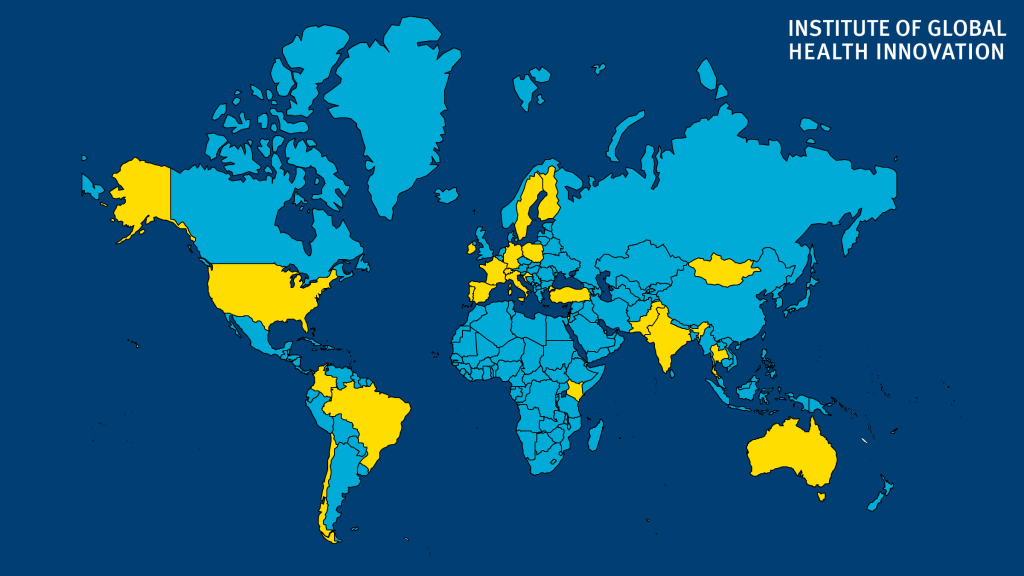
Healthcare is for all.
Here at the Institute of Global Health Innovation, we know there’s no better way to make progress towards this than working together.
Global collaboration allows us to learn from each other’s experiences and successes and can result in unique solutions which carefully consider cultural and systemic differences.
To mark World Health Day, we’re shining a light on five IGHI projects, where working with international partners has brought tremendous benefits when creating innovative responses to healthcare challenges.
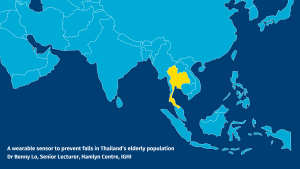 A wearable sensor to prevent falls in Thailand’s elderly population
A wearable sensor to prevent falls in Thailand’s elderly population
Dr Benny Lo is a senior lecturer at our Hamlyn Centre. He has been collaborating with the National Electronics and Computer Technology Centre (NECTEC) in Thailand to develop a wearable sensor for fall prevention in older adults.
“Falls, especially for older adults, are a major healthcare challenge. Falls can lead to injuries, disabilities and even death.
“Supported by the Newton Fund, we’re creating an intelligent sensing system for monitoring people with dementia. Our solution alerts staff in local hospitals and residential care homes when falls may happen. Our aim is to develop this fall prevention technology into a low-cost solution to address the needs of people in Thailand.
“Working with the NECTEC team, we have learnt much about their research and the healthcare challenges in Thailand, enabling us to further our research in developing sensing devices for low- and middle-income countries.”
Designing a children’s hospice in Italy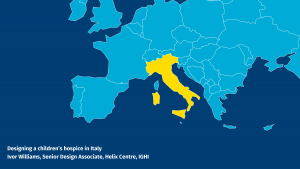
Senior design associate at our Helix Centre, Ivor Williams, is working with Fondazione Isabella Seràgnoli in Bologna, architects Renzo Piano Building Workshop and Italian design studio dotdotdot. Together they’re researching and building innovative prototypes to create a brand-new children’s hospice in Italy.
“Developing an innovative children’s hospice in Italy takes more than just working with our partners in Italy in a practical sense: it’s about learning the subtle differences in culture, practice and environment that underpin clinical care in different countries. We can’t assume what may work in the UK will work elsewhere.
“Our collaboration with our Italian partners helps create the foundation for an approach that means we can work not only in European countries like Italy, but around the world where children’s palliative care is in need of innovation and development.”
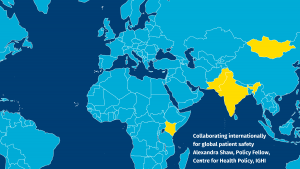 Collaborating internationally for global patient safety
Collaborating internationally for global patient safety
Alexandra Shaw is a policy fellow for the Global Patient Safety Collaborative (GPSC) at our Centre for Health Policy. In 2019, IGHI was chosen as partner for the GPSC, an alliance between the UK government and the World Health Organization to train and equip the next generation of leaders in patient safety in low- and middle-income countries. In the first phase, the GPSC is partnering with Kenya, India, Mongolia and Pakistan.
“The WHO Global Patient Safety Collaborative (GPSC) provides an opportunity to share learning and for countries to work with each other in improving the safety of care for patients globally.
“Global collaboration is key as it enables knowledge sharing both within and between countries. Working collaboratively brings different perspectives and experiences together. It enhances and enriches sharing and discussions, helping us develop new solutions to healthcare challenges.
“It provides opportunities not only for low- and middle- income countries to learn from high-income country (HIC) experiences and for resources to be shared, but also equal opportunity for HICs to benefit from reverse innovation to improve the safety of care.”
Developing medical robotics for surgery with experts in Hong Kong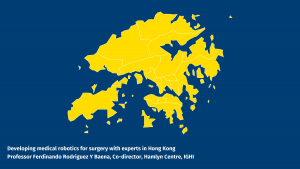
Professor Ferdinando Rodriguez Y Baena is the co-director of our Hamlyn Centre.
Together with the Chinese University of Hong Kong (CUHK), Hamlyn recently launched a joint flagship Multi-Scale Medical Robotics Centre (MRC) based at Imperial’s South Kensington campus.
“The MRC is part of a global collaboration with leading clinical and surgical robotic technology groups from CUHK, ETH Zurich, Johns Hopkins University, and Imperial College London. The Centre’s aim is to build knowledge and resources in pursuit of a new generation of smart devices for surgery.
“This is a unique partnership between the US, Europe and China which brings much potential. Together, the MRC promises to address some of the outstanding open challenges in this field, with strong clinical and engineering links between the groups and the opportunity to access state-of-the-art preclinical facilities at our partner site in Hong Kong.”
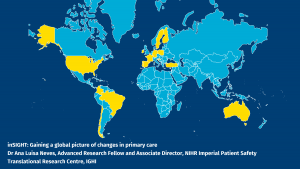 Gaining a global picture of changes in primary care
Gaining a global picture of changes in primary care
Face-to-face consultations with GPs rapidly shifted to “digital-first” solutions, such as telephone, video, or online services during the pandemic. To better understand the extent of these changes in primary care and lessons for the future, Advanced Research Fellow and Associate Director of our NIHR Imperial Patient Safety Translational Research Centre, Dr Ana Luisa Neves has launched an international survey called inSIGHT.
“We have partnered with colleagues from the European General Practice Research Network, the research group of the European Association of General Practice and identified national leads from 20 countries including France, the United States and Australia.
“This global network allowed us to set up a research structure where local leads took an active role both in study design and participant recruitment, capitalising on their own contacts and national knowledge.
“This project would not have been possible without a truly engaged global team, and a shared vision on the importance of learning from this challenging experience to identify lessons for future primary care. More than 1,500 GPs have shared their views through our survey.
“Working together with an international team, we hope to grow our evidence on the impact of these models and offer recommendations to policymakers who are working on integrating digital-first technologies into a post-COVID-19 healthcare environment globally.”